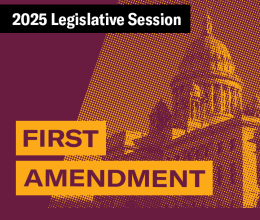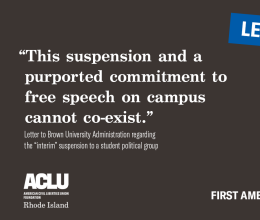In a setback to the religious freedom of institutionalized persons, U.S. District Judge William Smith has ruled that the Department of Corrections could bar an ACI inmate from preaching during Christian religious services at the state prison. The plaintiff, Wesley Spratt, had been preaching at ACI services for seven years before he was unilaterally stopped from doing so based on vague and generalized “security” concerns. In an appeal filed earlier this year, the RI ACLU had argued that the preaching ban violated a federal law designed to protect the religious freedom of the institutionalized. However, in a brief three-page opinion, Judge Smith, while calling the case “somewhat of a close call,” rejected that argument.
Spratt, who considers his preaching a “calling” from God, had been preaching at religious services on a weekly basis under the supervision, and with the support, of clergy at the ACI. The DOC provided no evidence of security problems during, or as the result of, his supervised preaching during the seven years he had been doing so. Nonetheless, when a new warden took over the maximum security facility in 2003, Spratt was ordered to stop preaching.
Ruling on Spratt’s pro se lawsuit in November, U.S. Magistrate Judge Jacob Hagopian upheld the ban. Notwithstanding the lack of any security problems in the years Spratt had been preaching, Hagopian ruled that he would “defer” to the warden’s judgment that there was no means to accommodate Spratt’s preaching while maintaining institutional security. In taking over Spratt’s appeal, RI ACLU volunteer attorney Carly Beauvais Iafrate argued earlier this year that the DOC failed to meet the standards of a federal law, known by its acronym RLUIPA, protecting prisoners’ religious freedom. That law bars states from imposing any substantial burden on an inmate’s exercise of religion unless it furthers a compelling interest and is the least restrictive means available.
The ACLU’s Iafrate had argued that, unlike a ban, “supervised preaching that existed in an unremarkable way for seven years” was clearly the least restrictive means available to prison officials. She pointed out that supervised preaching is also the method used in federal prisons to accommodate inmates’ exercise of religion. However, Judge Smith upheld the Magistrate’s ruling. The ACLU is considering appealing to the First Circuit Court of Appeals.
RI ACLU executive director Steven Brown said today: “The court’s ruling gives virtually unfettered discretion to prison officials to deny inmates the right to practice their religion. This not only damages the rehabilitative goals of prison, it undermines a fundamental legal right that Congress recognized even inmates should possess.”







